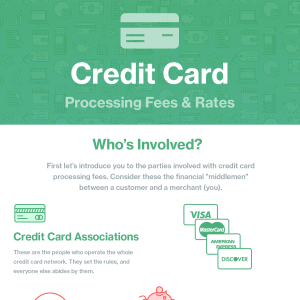This go-to guide on surcharging details what surcharges are, the legal requirements surrounding them, and whether (or not) your business should charge them.
Like everything else these days, the cost of accepting credit cards is going up. While for many years merchants grudgingly accepted card processing rates and fees as ‘the cost of doing business,’ today, more and more business owners are turning to credit card surcharging as a way to pass those costs onto their customers who choose to pay by credit card.
According to PYMNTS, 85% of customers agree to credit card surcharges, and according to Forbes, only 15% of new merchants have credit card surcharge policies in place.
So, should your business adopt a credit card surcharge policy? We’ll dive into exactly what credit card surcharges are, how they work, when to create a credit card surcharging policy, and more.
What Is A Credit Card Surcharge?
A surcharge is a small fee that is added to the cost of a transaction if the customer chooses to pay with a credit card. Surcharges are intended to cover the merchant’s cost for processing the transaction.
Instead of the merchant having to absorb this expense, the customer who chooses to pay by credit card pays for the processing costs that do not apply to other payment methods.
Credit Card Surcharging VS Cash Discounting
Surcharging is sometimes called “zero-fee” or even “free” credit card processing. You might have also heard of cash discounting, which is when the customer receives a discount equivalent to the cost of credit card processing if they pay in cash (or by paper check or debit card).
While both of these methods pass the cost of credit card processing onto the consumer, the difference is that with surcharging, the extra cost is added to the advertised price, while with cash discounting deducts the cost from the advertised price when a payment method other than a credit card is used.
For merchants, the most important distinction between these two methods is that cash discounting is legal everywhere in the US, whereas surcharging credit cards is still prohibited in a few states and territories.
How Do Credit Card Surcharges Work?
When a customer chooses to pay by credit card, a merchant with a legal credit card surcharging policy in place, adds an additional charge to the customer’s invoice or receipt. This surcharge covers the payment processing fee that merchants have to pay in order to process credit cards, so the charge itself should be (and is legally required to be) no more than the cost of the payment processor.
Merchants can then use the surcharge amount collected to cover their payment processing fees.
Is It Legal To Add A Credit Card Surcharge?
For years, credit card surcharging was illegal; however, recent lawsuits have made the practice legal in the majority of US states, so long as merchants comply fully with the credit card surcharge requirements. Only three states currently forbid credit card surcharging outright including Connecticut, Maine, and Massachusetts.
Credit Card Surcharge Laws
While credit card surcharging is legal is 47 states, there are strict surcharging requirements that must be met in order to legally practice surcharging. Merchants must also follow all surcharging requirements imposed by the credit card associations (Mastercard, Visa, American Express, and Discover).
Before we discuss the various credit card association guidelines for surcharges, let’s address whether it’s legal to charge a fee for using a credit card — or not. You will need to check the laws for the state(s) where your business operates. Over the past several years, the number of jurisdictions that prohibit credit card surcharging has diminished as legal challenges have resulted in many laws banning the practice being overturned by the courts.
States That Don’t Allow Credit Card Surcharges
As of early 2023, only three states and one US territory (Puerto Rico) still prohibit credit card surcharging. In the following jurisdictions, you won’t be able to impose surcharges (at least for now):
- Connecticut
- Massachusetts
- Maine
If your business operates in one of these jurisdictions, imposing a credit card surcharge is illegal.
However, you can still offer a discount for customers who want to pay by cash or check instead. You can incentivize cash-paying customers with a discount, as opposed to discouraging card payments by adding a fee.
Legal Requirements For Credit Card Surcharging
Once you check that your state does allow surcharging, there are still several legal requirements for credit card surcharging that must be met:
- You must live in a US state or territory that allows credit card surcharges.
- You cannot impose a surcharge on prepaid or debit cards, only on credit cards.
- You must clearly advertise your credit surcharging policy.
- Credit card surcharges must be its own line item on invoices.
- The surcharge cannot exceed the cost of the payment processing fee, cannot be intended for profit, and cannot exceed 4% (2% in Colorado).
What does this mean for non-consumer businesses?
It’s also important to note that the limitations on surcharging generally only apply to consumer businesses. Separate laws and regulations affect the ability of government agencies and educational institutions to implement surcharges, and these are allowed even in states that prohibit surcharging by consumer businesses.
What does this mean for businesses with locations in multiple states?
So how does all of this affect large businesses that have multiple locations? If your business operates in multiple states, you can still add a surcharge in states that allow the practice — just not in the ones with bans. You’ll want to verify that you’re compliant with each state’s credit card surcharge laws as well.
Should You Add A Credit Card Surcharge Policy?
Credit card surcharging has rapidly gained in popularity in recent years as court decisions and legislative changes have gradually removed legal barriers to the practice. Merchants struggling to stay ahead of rising costs have increasingly turned to credit card surcharging as a way to lower operating expenses and keep their businesses profitable.
Although you can now legally charge credit card surcharging fees in most states, should you?
Here are the advantages and disadvantages of creating a surcharging policy:
The Pros Of Credit Card Surcharging
- You can recoup some of the costs of processing card payments
- May encourage customers to choose payment options that are more affordable for you as a merchant (like cash or ACH payments)
- Many customers are used to paying this type of fee and may not mind it
The Cons Of Credit Card Surcharging
- May impact customer retention and loyalty if customers in your area of business aren’t used to this type of fee
- Some customers may want to shop elsewhere if they can get the same product or offering without paying a fee
- Makes payment processing more complicated since surcharges need their own line item on invoices and receipts
- Must comply with credit card surcharge laws and regulations (which may possibly change or evolve)
How To Save Money On Credit Card Processing Fees Without Surcharging
There are several ways to save on payment processing fees without adding a surcharge policy if the pros don’t outweigh the cons for your business. You may also want to add these money-saving strategies in addition to implementing a credit surcharge policy to help offset the cost of processing debit card payments which cannot have a surcharge added to them.
How To Legally Create A Credit Card Surcharge Policy
Once you’ve read and understood the core credit card surcharge rules, there’s still more work to do. You must notify your merchant acquirer and the relevant card networks that you intend to start imposing a surcharge.
Now that we’ve covered the core rules, let’s take a closer look at some of the common issues that come up with surcharge processing — from how much you can charge to who you need to contact.
Make Sure Your Payment Processor Can Handle Surcharges
First things first, you need to ensure that your payment gateway or processing equipment is reprogrammed to accurately record the surcharges in accordance with the card network requirements.
If your business primarily operates on invoicing, you’ll need to make sure you add a separate invoice line item to credit card paying customers.
Notify Your Processor & Card Networks
The best way to notify your processor of your intent to start surcharging is to reach out to the account representative for your merchant account and ask how they want to proceed. You must provide a written notice, so a phone call isn’t sufficient. However, your account representative (or anyone working in the customer service department if you don’t have a dedicated representative) should be able to tell you to whom you should direct that request.
Only Add Surcharges To Credit Cards
Make sure you only add surcharges to credit transactions.
Even transactions processed using signature debit (often called “running a card as credit”) are still debit and exempt from surcharging.
That’s because of the restrictions implemented by the Durbin Amendment of the Dodd-Frank Wall Street Reform and Consumer Protection Act. The Durbin Amendment specifically deals with debit transactions, including the implementation of a cap on credit card interchange fees.
Give Appropriate Notice To Consumers
If you plan to add surcharges, you need to post a notice at the entry to your store letting customers know that you add a surcharge to all credit card transactions. You must also post a notice at your point of sale (your register). The notice must include the rate you charge and a comment that it doesn’t exceed your processing fees.
If you invoice your customers, you similarly need to include a disclosure about your credit card surcharge policy on your invoice (most of the best invoicing software companies provide a notes section on invoices which you can use for this purpose).
Two states require additional disclosures to surcharge credit card processing fees: Maine and New York. In both cases, you must post both the cost of paying with cash and the cost of paying with a card using dollars and cents. This is on top of Visa, Mastercard, American Express, and Discover policies, which require you to post notifications at the point of sale and specify the surcharge amount.
How does this work for eCommerce businesses?
The requirements for surcharging eCommerce transactions are very similar. While you can’t post a notice at your store entrance, you must include the disclosure in the checkout process, and the surcharge must be featured on the receipt.
Correctly Document Surcharges On Credit Card Transactions
If you plan to implement surcharges, keep in mind that Visa, Mastercard, and Discover require your point of sale system to include the surcharge as a line item.Whether you sell online or in person, your surcharge needs to be included on the receipt as well.
Report Surcharges Back To Your Processor & Credit Card Networks
You must also report all surcharges back to your processor and the credit card networks. So before you decide to implement a surcharge, you should check that your existing processing setup supports it.
If you need payment processing software to help simplify this process, Square supports surcharging to help offset your Square fees, provided that you follow the guidelines outlined above in this post. You can also check out our list of the best online payment processing companies for more options.
Credit Card Surcharge FAQs
What is the maximum credit card surcharge?
Merchants are only allowed to recoup their actual processing costs through surcharging, but under no circumstances can the surcharge exceed 4%. Unfortunately, many providers offering surcharging programs impose a flat 4% fee on every surcharged credit card transaction, which is significantly higher than the average processing cost for most low-risk businesses. This practice results in windfall profits for the processor, but comes at the expense of customers who have to pay the inflated surcharge.
What is the difference between a surcharge and a convenience fee?
A convenience fee is a fixed-rate fee added to a customer’s bill if they pay via credit card instead of an alternative payment method. Unlike surcharges, convenience fees aren’t tied to the actual cost of processing a credit card transaction. Also, the credit card associations have separate rules for convenience fees.
How are credit card surcharges calculated?
Credit card surcharges cannot exceed the actual cost to process a transaction and are capped at a maximum of 4% (2% in Colorado). Your merchant services provider will reprogram your payment gateway or processing hardware (i.e., countertop terminal, point of sale (POS) system) to calculate and apply the surcharge to applicable transactions automatically.
What are the requirements for surcharging?
To implement surcharging, merchants must (1) notify the credit card associations of their intent to surcharge at least 30 days in advance, and (2) post adequate notice to customers that they will have to pay a surcharge for paying with a credit card. This notice can be in the form of physical signs in a retail location or banners on the merchant’s website. The surcharge must also be identified as a separate item on all receipts.












